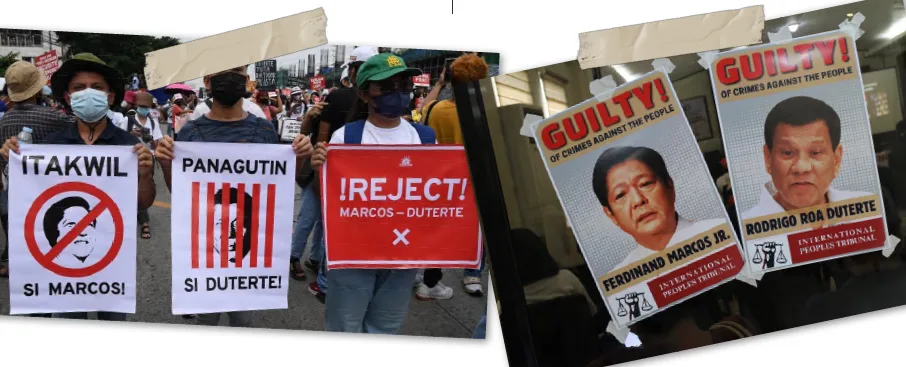The political alliance between the Marcos and Duterte families, formed to consolidate power and win the 2022 Philippine elections, has disintegrated. Forged out of necessity, the collaboration was meant to restore Bongbong Marcos’ family image and secure the Duterte camp’s influence, as both families have dark pasts of brutal rule. While Bongbong Marcos sought to bury the evil legacy of his father’s fascist dictatorship and preserve his family’s stolen wealth, Sara Duterte anticipated her turn in the presidency after serving as vice president.
After their electoral victory, Marcos wasted no time consolidating his grip on power. Marcos gave Sara Duterte a traditionally less desired position as secretary of the Department of Education. He filled key posts in the Senate and the House with loyal allies, securing his dominance. Marcos even pursued constitutional amendments to extend his stay in Office, reminiscent of the Duterte camp’s failed attempts to alter the Constitution for their benefit. Public opinion increasingly saw this as a blatant power grab disguised as a “People’s Initiative.”
The Duterte camp, however, did not take these actions quietly. Sara Duterte resigned from the LAKAS-CMD party, the majority in the House led by Marcos’ cousin Martin Romualdez. Rodrigo Duterte joined the fray, publicly calling Marcos lazy and accusing him of drug use.
In retaliation, the Marcos administration targeted the Duterte camp’s most ardent supporters: Quiboloy and the SMNI network, as well as Roque and Badoy. Additionally, the Marcos-controlled Lower House began investigating Duterte-linked offshore gambling ventures, known as POGOs, which were connected to money laundering and human trafficking—these further deteriorated relations between the two camps.
By June 2024, Sara Duterte resigned from her cabinet position, formalizing her break from the Marcos administration. On the other hand, questions have also been raised about the Office of the Vice President (OVP) under Duterte. Lawmakers questioned the OVP’s budget mismanagement and corruption. Sara Duterte’s evasiveness when questioned about these issues during budget hearings has further fueled public outrage leading to moves to impeach her from the vice presidency.
The rift between Marcos and Duterte was also evident in their foreign policies. Marcos aligned himself more closely with the US, unlike Duterte, who had favored closer ties with China during the early years of his presidency. Many Filipinos, however, now see both families as puppets, allowing the Philippines to be used as a pawn in an inter-imperialist struggle for dominance, disregarding the country’s sovereignty, regional stability, and the welfare of its people.

Despite this long-drawn political spectacle caused by the Marcos-Duterte split, it is important for the Filipino people to remember that:
- Both the Marcoses and the Dutertes belong to the same bureaucrat capitalist class competing against each other to secure positions of power not to serve the people, but to get as much loot from public funds.
- The Marcos-Duterte alliance was inevitably bound to collapse due to their competing interests to remain in power. As representatives of the ruling class, they would occasionally “unite” and settle which positions in government to hold, but this type of alliance never lasts and would crumble at the slightest sign of a power grab.
- From Rodrigo Duterte’s bloody ‘war on drugs’ to Marcos’ horrid counterrevolutionary programs, both camps are guilty of war crimes against the Filipino people.
- Once out of the power, the former ruling clique would go to self-preservation mode and seek to protect its loot, evade liability for their crimes and abuses against the people, and relentlessly try to return to power as we have witnessed Marcos return to Malacanang and the Duterte family’s moves to protect their bases.
The intensifying rift between the Marcos and Duterte political camps only exposes the putrid state of Philippine politics – at a time when the prices of basic goods are soaring, and the toiling Filipino masses are facing unprecedented economic hardships while the minimum wage remains stagnant. The poorest, already grappling with the most dire conditions, are the hardest hit, struggling to survive amid the constant political bickering between the two reactionary camps.
In the end, the spectacle of the Marcos-Duterte power struggle, distracts from the deeper socioeconomic issues of landlessness and widespread poverty that are plaguing the masses. Regardless of which political faction prevails, it is the Filipino people who are at the losing end.
The role of the revolutionary movement is critical in this unfolding situation. By exposing the self-serving character of the ruling elites represented by the Marcos and Duterte dynasties and by clarifying to the masses how the two camps are both reactionaries, the revolutionary movement can channel the people’s aspiration for revolutionary change. Arousing, organizing and mobilizing the masses intensifies efforts to dismantle the repressive structures built by the ruling class. The conditions for revolutionary change therefore are not only ripe for the taking; they are the most favorable for the revolution as they have ever been.

